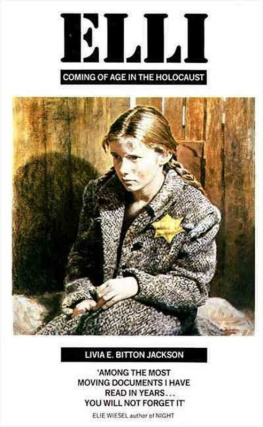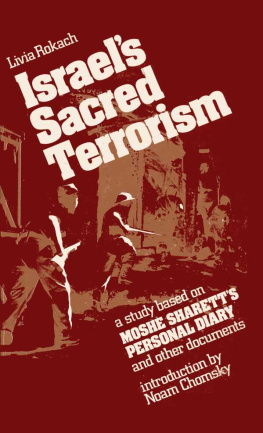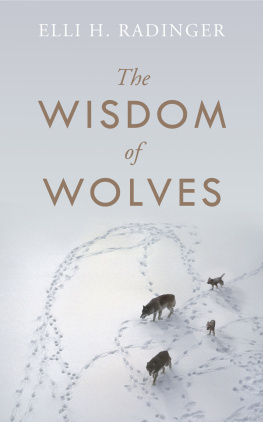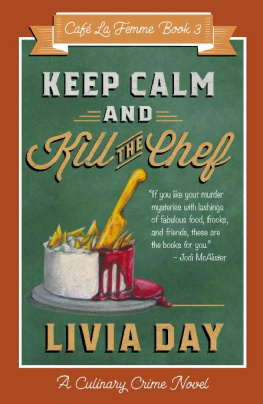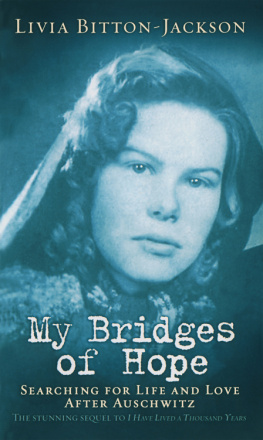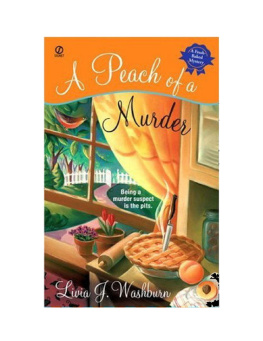Livia Bitton-Jackson - Elli: Coming of Age in the Holocaust
Here you can read online Livia Bitton-Jackson - Elli: Coming of Age in the Holocaust full text of the book (entire story) in english for free. Download pdf and epub, get meaning, cover and reviews about this ebook. genre: Children. Description of the work, (preface) as well as reviews are available. Best literature library LitArk.com created for fans of good reading and offers a wide selection of genres:
Romance novel
Science fiction
Adventure
Detective
Science
History
Home and family
Prose
Art
Politics
Computer
Non-fiction
Religion
Business
Children
Humor
Choose a favorite category and find really read worthwhile books. Enjoy immersion in the world of imagination, feel the emotions of the characters or learn something new for yourself, make an fascinating discovery.
- Book:Elli: Coming of Age in the Holocaust
- Author:
- Genre:
- Rating:4 / 5
- Favourites:Add to favourites
- Your mark:
- 80
- 1
- 2
- 3
- 4
- 5
Elli: Coming of Age in the Holocaust: summary, description and annotation
We offer to read an annotation, description, summary or preface (depends on what the author of the book "Elli: Coming of Age in the Holocaust" wrote himself). If you haven't found the necessary information about the book — write in the comments, we will try to find it.
Elli: Coming of Age in the Holocaust — read online for free the complete book (whole text) full work
Below is the text of the book, divided by pages. System saving the place of the last page read, allows you to conveniently read the book "Elli: Coming of Age in the Holocaust" online for free, without having to search again every time where you left off. Put a bookmark, and you can go to the page where you finished reading at any time.
Font size:
Interval:
Bookmark:
Elli Coming of Age in the Holocaust
By Livia E. Bitton Jackson
Somorja is a small, sunny town at the foot of the Carpathian mountains. The familiar hills loom in a blue haze towards the west. To the south a forest rises, near and immediate, an inviting green oasis stretching to the bank of the Danube a kilometre away. And the Danube, this cool rapid river, is the heart of our town. It pulsates with the promise of life, of perpetual motion. I love this clear, blue, surging river. I love to swim in its rippling waters and lie in the shade of the bushes hugging its edge.
Swarms of children splash all summer in the Danube. Families picnic on the grass, the soccer team has its practice ground nearby, and the swimming team trains for its annual meet. Even the army camp empties once a day its sweaty contents of hundreds of recruits into the cleansing waters of the river.
Towards the evening, as the sun moves beyond the hills, herds of sheep and cattle arrive at the Danube. The shepherds drive the sheep first and then the horses and cows into the water, cursing louder and louder, and drive us children out. The mosquitoes arrive, too, with the dusk, and then it is time to go home.
The walk through the open pasture is pleasant and cool, but the town is hot and dusty when we get home. The sheep arrive before us, and it is they who churn up the dust. But soon the dust settles, and so does the night. A dark velvety blanket of silence wraps the town snugly against the intrusion of the outside world. The stars one by one light up the dirt roads and the single paved street of the town. By nine oclock all is quiet. Only a restless dog barks here and there. Soon the dogs, too, go to sleep. Lying in my bed, I can hear when the orchestra of insects begins its song, the harmony interrupted by the croaking of a single frog. There is a small swamp beyond the last houses of our street surrounded by tall grass. In the tall grass mystery lurks, deep dark secrets of a hidden world.
With eyes closed I lie for hours and daydream. Life is a mystery to me. A beautiful, secret mystery. In my dreams I am a great poet. Beautiful, talented, and very famous. My poems open the secret heart of the world and its embrace carries me far away.
Secretly, every evening I am studying Latin. I hope to pass entrance examinations to the gymnasium and thus persuade Daddy to let me enrol. The gymnasium is in Budapest, the capital.
It is a big and beautiful city with wide streets and very tall buildings and yellow streetcars whizzing around corners. All the streets are paved. In our town we have only one paved street, the main street. And of course it is not so wide as the streets of Budapest. And we have no tall buildings. The tallest building is the city hall, two storeys high. There are no streetcars in our town. Only horse-drawn wagons and only two automobiles. One of them belongs to my friends father.
The thousand-wing-insect orchestra lulls me to sleep. At five in the morning I am awakened by the tooting of the shepherds horn. The cows moo a response, and the horses neigh restlessly. The gates open, one by one, and the beasts march dutifully down the street. The shepherd cracks his whip and the stench of manure fills the morning air.
When the cows and horses turn the bend in the road, and the shepherds horn and curses become a distant sound, the second shepherds horn penetrates the air. A deeper sound. Again the gates open. Goats and sheep pour into the street. A somewhat less noisy, less dusty, less smelly procession.
Then come the pigs. A stampeding herd of swine is the noisiest, the messiest thing in the world. Oh, I do hate the pigs!
When the pigs, too, pass around the corner, the gates open for the fourth time. In every door a housewife appears with a long wicker-broom. Good morning! Good morning! And within minutes the streets are swept clean of the round flat marking of the cows, the yellow corn muffins of the horses, and the small black pebbles of the goats. Good morning! Good morning!
As the last gate closes shut, I go back to sleep. To dream. Our little town is made for dreaming.
Nothing happened during that week in town.
The small Jewish community waited in silence. No one knew what was happening elsewhere. There was no news of other Jews in other towns. No news at all. No Jew from another town came to our place, and no Jew left the town. Our Gentile neighbours confirmed Bubis report that on trains and buses Jews were arrested on sight and put into cattle cars. The cattle cars were locked and driven off.
Fear sealed every Jew into his home. Mummys words of comfort did little to ease the tension in our house. Bubi kept up his schoolwork with difficulty despite Mummys encouragement and exhortations to carry on, all this would pass soon, and he would pick up in school where he left off. It was the twelfth hour of the war, she said. Daddy paced the floor of our spacious kitchen like a caged lion. What was to be done?
I alone continued my routine. School was as usual, nothing had changed there. There was no sign of the German occupation either on the street or in the classroom. It was an escape into normalcy. It was a relief to leave my house every morning and enter the familiar world of unaltered schedules of classes and recesses, carefree camaraderie with fellow students and absorption in lectures unrelated to the world threatening to engulf the Jew.
Then, suddenly, on Saturday morning all schools were ordered closed.
It was 25 March 1944three months before graduation. Our homeroom teacher made the announcement in terse, staccato sentences: Class, the Royal Hungarian Ministry of Education has terminated instruction in all schools of the countryto safeguard our interest.
Her voice broke. Tears welled in her eyes. Almost inaudibly she said: Goodbye, class children. You can all go home now.
That is all? Not a word of explanation? What are we to do now? Will we graduate? Will we get our report cards? Mrs Kertsz left the classroom without giving us a chance to ask questions. No mention of the German occupation. No indication of what was to happen next. Of what awaited us.
We looked at each other, shocked. Confused. Then, one by one, my classmates stood up and began filing out of the room.
I got up, too, and looked around. The dark, oil-stained floor. The worn wooden benches. The white-washed walls with their threadbare maps and faded pictures. It was all so familiar, so reassuring. Even the dark-green crucifix above the door. For almost four years I had struggled, sweated, and sometimes triumphed among these walls, in front of this blackboard. The stale smell of the oiled floor mingled with rising chalk dust, with fear, with jealousy, or joy.
Will I ever sit behind my narrow desk in the last row? Will I ever see my classmates? Will I ever sense the substance of childhood filtering through the ambience of this room again?
Perhaps soon the schools will reopen. Perhaps soon the country will settle down under German occupation and everything will be just as before. Classes will resume and our group will graduate as planned. I was certain of that. I was quite certain.
I decided to leave by the main entrance. The boys classes use the main entrance. Maybe Jancsi Novack will be leaving just now, too. I wanted to see him for the last time.
As I turned into the hallway leading to the main staircase, an arm reached out and blocked my way. I looked up, astonished. It was not Novack. A stocky, pimply-faced boy with dark hair slicked back stood in my way, grinning. He raised his right arm in the Nazi salute and said: Heil, Hitler! A group of fifteen boys lined both sides of the stairs. And they echoed: Heil Hitler! Grinning.
As I passed them, they began to chant: Heil, Hitler! Sieg heil! Sieg heil! Sieg heil! I ran down the stairs. The stocky boy shouted: Down with the Jews! Down with the Jews!
Next pageFont size:
Interval:
Bookmark:
Similar books «Elli: Coming of Age in the Holocaust»
Look at similar books to Elli: Coming of Age in the Holocaust. We have selected literature similar in name and meaning in the hope of providing readers with more options to find new, interesting, not yet read works.
Discussion, reviews of the book Elli: Coming of Age in the Holocaust and just readers' own opinions. Leave your comments, write what you think about the work, its meaning or the main characters. Specify what exactly you liked and what you didn't like, and why you think so.

